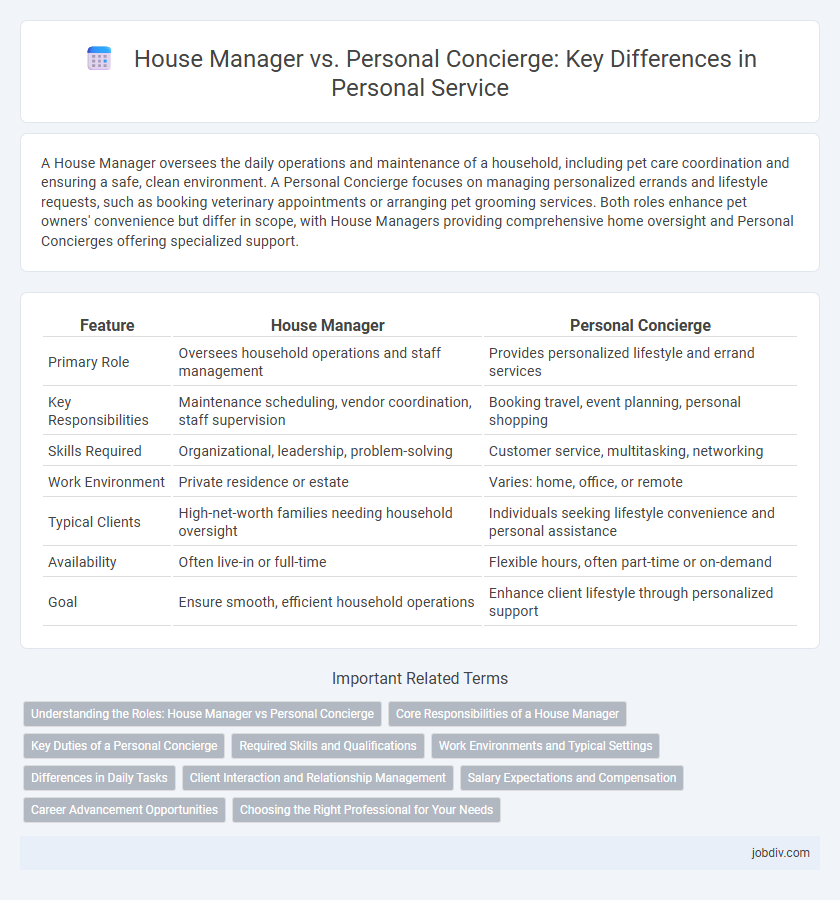A House Manager oversees the daily operations and maintenance of a household, including pet care coordination and ensuring a safe, clean environment. A Personal Concierge focuses on managing personalized errands and lifestyle requests, such as booking veterinary appointments or arranging pet grooming services. Both roles enhance pet owners' convenience but differ in scope, with House Managers providing comprehensive home oversight and Personal Concierges offering specialized support.
Table of Comparison
| Feature | House Manager | Personal Concierge |
|---|---|---|
| Primary Role | Oversees household operations and staff management | Provides personalized lifestyle and errand services |
| Key Responsibilities | Maintenance scheduling, vendor coordination, staff supervision | Booking travel, event planning, personal shopping |
| Skills Required | Organizational, leadership, problem-solving | Customer service, multitasking, networking |
| Work Environment | Private residence or estate | Varies: home, office, or remote |
| Typical Clients | High-net-worth families needing household oversight | Individuals seeking lifestyle convenience and personal assistance |
| Availability | Often live-in or full-time | Flexible hours, often part-time or on-demand |
| Goal | Ensure smooth, efficient household operations | Enhance client lifestyle through personalized support |
Understanding the Roles: House Manager vs Personal Concierge
A House Manager oversees household operations, including staff supervision, maintenance coordination, and budget management to ensure a smoothly running residence. A Personal Concierge focuses on personalized services such as booking appointments, managing errands, and arranging travel, catering to an individual's lifestyle needs. Understanding these distinct roles clarifies how each professional contributes to enhancing home life efficiency and personal convenience.
Core Responsibilities of a House Manager
A House Manager oversees daily household operations, including staff supervision, maintenance coordination, and budgeting to ensure smooth and efficient management of a residence. They handle vendor relations, schedule repairs, and manage inventories for household supplies, emphasizing operational oversight. Unlike a Personal Concierge, whose role centers on personalized errands and guest services, the House Manager's core responsibility is maintaining the functionality and organization of the entire household.
Key Duties of a Personal Concierge
A Personal Concierge handles diverse tasks such as managing calendars, booking travel arrangements, and coordinating household services to ensure smooth daily operations. They often provide personalized shopping assistance, event planning, and errand running tailored to the client's preferences. Key duties emphasize convenience, time-saving solutions, and enhancing the client's lifestyle through attentive, detail-oriented service.
Required Skills and Qualifications
House Managers require strong organizational skills, experience in household management, and proficiency in budgeting and staff supervision. Personal Concierges need excellent interpersonal communication, problem-solving abilities, and deep knowledge of local services and luxury amenities. Both roles demand discretion, time management, and adaptability to client preferences.
Work Environments and Typical Settings
House managers typically operate within private residences, managing household staff, coordinating maintenance, and overseeing daily domestic operations to ensure smooth home functioning. Personal concierges often work in luxury hotels, corporate settings, or upscale residential complexes, providing personalized services such as booking reservations, arranging transportation, and fulfilling client requests to enhance convenience and lifestyle. Both roles demand exceptional organizational skills but differ in their work environments, with house managers deeply embedded in residential life and personal concierges oriented toward client service in public or semi-public venues.
Differences in Daily Tasks
A House Manager typically oversees household operations, including maintenance scheduling, staff management, and inventory control, ensuring the seamless running of the home. In contrast, a Personal Concierge primarily focuses on personalized services such as booking travel, arranging events, and providing lifestyle management tailored to the client's preferences. While both roles enhance convenience, the House Manager handles logistical and domestic responsibilities, whereas the Personal Concierge manages external errands and luxury lifestyle coordination.
Client Interaction and Relationship Management
House Managers maintain direct, consistent communication with clients to oversee household operations and anticipate their needs, ensuring personalized service and smooth daily management. Personal Concierges prioritize proactive engagement, offering tailored recommendations and coordinating unique experiences to enhance client satisfaction and build rapport. Both roles require strong interpersonal skills, but House Managers focus on internal household efficiency while Personal Concierges emphasize external service facilitation and client lifestyle enhancement.
Salary Expectations and Compensation
House managers typically earn between $50,000 and $90,000 annually, reflecting their comprehensive duties in household oversight, staff management, and maintenance coordination. Personal concierges usually command salaries ranging from $40,000 to $70,000, with compensation heavily influenced by client base, location, and service specialization. Both roles may receive bonuses, benefits, and perks, but house managers often enjoy higher base salaries due to their broader range of responsibilities.
Career Advancement Opportunities
House managers offer extensive career advancement opportunities by overseeing multiple household staff, managing large estate operations, and refining leadership skills applicable in luxury property management. Personal concierges gain career growth through specialized client service roles, expanding networks in hospitality and lifestyle industries, and often advancing to senior concierge or client relations positions. Both career paths provide unique prospects for skill development and professional upward mobility within the luxury service sector.
Choosing the Right Professional for Your Needs
Selecting the ideal professional between a house manager and a personal concierge depends on your lifestyle and specific needs for home organization and personal assistance. House managers typically oversee household operations, staff coordination, and maintenance schedules, ensuring seamless daily functionality. Personal concierges focus on personalized services such as errand running, event planning, and lifestyle management to enhance convenience and luxury.
House Manager vs Personal Concierge Infographic

 jobdiv.com
jobdiv.com